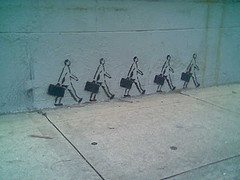Mar 15, 2012 Comments Off on Kurt Rosenwinkel Revisited
Kurt Rosenwinkel Revisited
I saw Kurt Rosenwinkel and his New Quartet (Aaron Parks, piano; Eric Revis, bass; Justin Faulkner, drums) last night at the Regattabar, almost a year to the day after I last saw him with his “old” quartet. While it took a couple numbers for the house to get the sound together (which seemed a little odd given this was the fourth set of a two day stand), this ended up being a capitivating and even beautiful performance.
Kurt continues to play with an astonishing fluidity and a marked lack of cliche; he also remains the master of the cascading, intricate pattern and the loping, open-ended composition reminiscent of Wayne Shorter. He tends towards an “atmospheric” tone that combines, at turns, chorus, delay, and distortion with a somewhat odd tendency to sing the lines as he plays them (he wore a mic to pick up these vocalizations). At times distracting, this sing-a-long approach did add an ethereal depth to his playing.
When I last saw him, I lamented that the group didn’t really shine as an ensemble. With this group, while it is definitely Kurt’s, it felt more like a band. Once they hit their stride, they really rocked.
My mystical tendencies seek transcendence in musical performance. Given the brainy, secular approach taken by Rosenwinkel, any transcendence on offer is strictly of the cool, technical variety.
That being said, this group, at its best, achieved something even more compelling: an immanent intensity rooted in the Now, focused on the openness of the moment, and imbued with a refreshingly human warmth.
